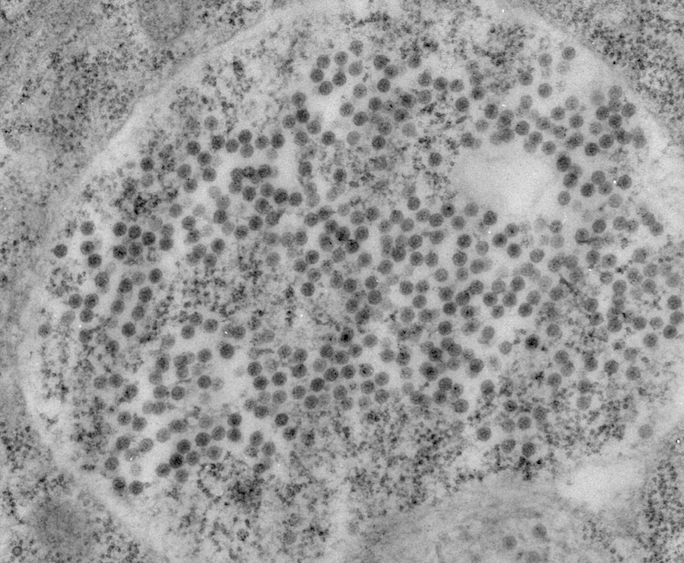|
Drosophila X Virus sounds like a science-fictionalized harbinger of the fruit fly apocalypse. Yet, during her Entomology colloquium on her research in progress, Qian Wang, a PhD candidate in Dr. Louisa Wu’s lab in the Department of Cell Biology and Molecular Genetics, explained how Drosophila X Virus (DXV) can be much more informative than it is destructive. DXV is an unenveloped icosahedral virus in a family of double-stranded RNA viruses called Birnaviridae. Double-stranded RNA should not be freely floating around in cells, so when it is detected, the immune system quickly mounts a robust response to destroy the RNA-based invader. This trait makes DXV the ideal candidate for biologists interested in investigating the inner workings of the Drosophila innate immune system. In a traditional approach to Drosophila genetics, Wang has been creating immune gene mutants of Drosophila that are more susceptible to DXV. These mutants have helped her identify the tissue localization of DXV during infection andDrosophila infection response. Coupled with bioassays and fluorescence microscopy, these mutants have uncovered valuable insight into the innate immune response to DXV. In a more avant-garde approach, Wang has sequenced the transcriptomes of her mutants encumbered and unencumbered with DXV. Application of the latest in RNAseq technology has allowed her to finely identify the gene families enriched and suppressed by the virus. Discerning the complex interactions of the immune and traditionally non-immune genes implicated in her investigation will be an immense step forward in understanding how Drosophila respond to infection with DXV. Hypotheses generated by this approach can be further validated with previous microscopic observations and bioassays. Application of leading edge scientific technology to a model system like Drosophila will likely impact our understanding of our own innate immunity. In her thorough characterization of this ominous sounding Drosophila virus, Wang is making strides on many scientific fronts. About Brian:
Brian Lovett is a PhD student studying mycology and genetics in agricultural and vector biology systems. He is currently working on projects analyzing mycorrhizal interactions in agricultural systems and the transcriptomics of malaria vector mosquitoes. Comments are closed.
|
Categories
All
Archives
June 2024
|
Department of Entomology
University of Maryland
4112 Plant Sciences Building
College Park, MD 20742-4454
USA
Telephone: 301.405.3911
Fax: 301.314.9290
University of Maryland
4112 Plant Sciences Building
College Park, MD 20742-4454
USA
Telephone: 301.405.3911
Fax: 301.314.9290


 RSS Feed
RSS Feed




